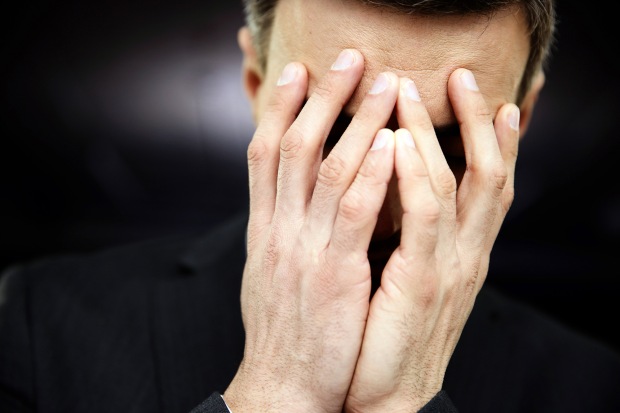
Frustrated man with hands on face
5 Natural Anxiety Remedies That Relieve Your Stress
Are you searching for natural anxiety remedies? Are you tired of experiencing the pain and frustration that comes with the uncertainty of not knowing when your anxiety will get the best of you or worse, having another panic attack? You are not alone but it must seem that way when you are feeling stress or anxiety which seems uncontrollable at times. It is possible that you have one of the more common anxiety disorders called Generalized Anxiety Disorder or GAD for short. This anxiety disorder is mostly characterized as a constant worrying, which is uncontrollable and may not be caused by serious events. For instance, you might be worried about picking up the kids on time or trying to get everything done on your to-do list. Constant worrying can lead to a loss of concentration on tasks and have a direct effect on the your professional and personal life. Here are five natural remedies for anxiety that may temporarily help alleviate your anxiety and stress.
1) Unfortunately, prescription drugs are usually offered as a remedy for such illnesses and they can be dangerous if used over a long period of time. The demand for alternative medicine has skyrocketed because many of them offer relief from symptoms without the side-effects linked to prescription drugs but natural remedies are not meant to be long-term treatments, although they can offer relief in the short-term. It is very important that you do your homework and research to increase your knowledge of any herb or vitamins to make sure it is the right thing for you to take. It is also a good idea to consult your family physician in order to ensure that the alternative treatment is safe for you.
St. John’s Wort is one of the most popular anti-anxiety herbs on the market. After taking St. John’s Wort for as little as two weeks, you should notice a difference in your anxiety level. Valerian Root is another herb you might want to try. It is especially helpful in combating insomnia because of its sedative quality as it helps to lull the central nervous system to sleep. Vitamins can also provide an effective treatment for anxiety and B-complex can help produce neurochemicals, which in turn, assists in the synthesis of seratonin, norepinephrine and dopamine. Kava Kava is considered to be one of the strongest anti-anxiety remedies in the world. Another aid to combating anxiety is Passion Flower because it helps to calm the central nervous system, leading to feelings of peace.
2) Exercising should make you feel less anxious. Your muscles become less tense and you will be calm and relaxed after at least 30 minutes of your favorite type of exercise. It has been shown that exercise leads to an hour and a half to two hours of relaxation response and this has been referred to as the endorphin response. As a result, your mood will improve, enabling you to deal more effectively with stress. Exercise can also improve your self-image and you will experience a greater sense of self-worth, which will reduce your stress level. A confident person is an individual who knows how to handle stress without becoming flustered.
3) Insomnia is one of the most dangerous side-effects of stress. It can rob you of your energy, strength, and endurance. but there are some steps you can take to improve your sleep. You can make sure that your bedroom is conducive to sleep by finding the most comfortable bedding available, decorating your room with soft, subtle colors, and eliminating clutter or other signs of work in progress. Try not to do work in bed and avoid watching TV. You want to try to eliminate stimulants from your sleeping area which could prevent you from falling asleep. If you like to read in bed, make sure that you read something light that will not engage your mind as you are trying to fall asleep.
4) Cooking is another way for you to relax and enjoy your time by making a hobby out of it. It takes a great deal of patience and persistence to become an excellent cook and you will feel a sense of accomplishment at the end of a good meal which can further reduce your stress level. You might want to invest in some good cooking supplies and take the time to learn the fine art of preparation to help ease your stress when the time to cook arrives. You can take a cooking class to meet new friends, learn new recipes and to learn how to properly use your new equipment.
5) One of the most rewarding activities you can choose to lower your stress is to engage in volunteer work. There is something that is comforting about donating your time to help someone else. This simple act can elevate your spirits, helping you to better cope with the stressors in your life. Your time is very valuable and you will be giving a tremendous gift back to your community. You may find your reward in the smiles on the faces of the people you have assisted.
We all have feelings of anxiety from time to time. But how can you tell if your anxiety is out of control? If you experience racing thoughts, rapid heartbeat, extreme difficulty resting or concentrating, you probably need to get help. If you do not like dealing with the side-effects of prescription drugs, an herbal remedy may be in order but this is usually only a temporary solution. You can choose one or many of the activities listed above to help you find relief and these tips will help deal with things today but you owe it to yourself to find the long-term solution for your anxiety.
For more information visit Natural Remedies for Anxiety

